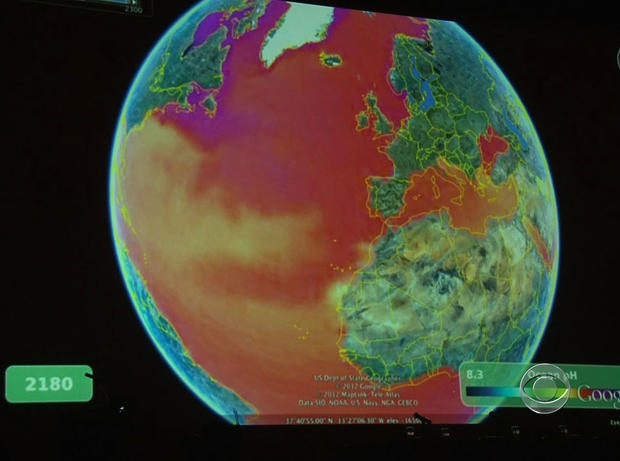Changing climate hurting shellfish market
(CBS News) QUILCENE, Wash. - The price of corn shot up 5 percent Thursday on a prediction from the government that this year's harvest would be the smallest in six years.
Much of the crop has been damaged by drought. Another crop affected by the changes in climate is hurting more than the farmers who work the land.
On the shores of Washington State's Olympic Peninsula, Bill Dewey is a shell fish farmer. He's been raising oysters, clams and mussels for 30 years.
Economic decline reduces carbon emissions slightly
Issue brief: Energy and Environment
"I'm in shellfish heaven -- just a gift of Mother Nature," Dewey said.
The Oyster Hatchery pumps in sea water to nurture baby oysters. They start life as microscopic specks of plankton.
Dewey said that the water may look dark when you first look at it, "But in fact there's 20 million baby oysters in this little tank in front of us here."
But suddenly, the ocean water is preventing new oysters from forming shells -- so they died.
"It dissolves the shells of the oysters we're trying to grow in it," Dewey said, saying that they were very vulnerable at this stage.
Dewey described the oyster die-off to hundreds of scientists gathered in Monterey, Calif., to study rising acid levels in world's oceans. They call it "ocean acidification" and with Google,
showing the long-term impact. The deepening red illustrates the expected rise in ocean acid levels over the next three centuries.
What is turning the oceans to acid is carbon dioxide from cars and factories. Thirty percent of CO2 released into the atmosphere is absorbed by the oceans. Oysters are the first victims.
"We're the so-called canary in the coal mine here" Dewey said.
At the hatchery, the sea water pumped in is now constantly monitored so the intakes can be closed when acid levels rise.
"Inevitably, as the ocean conditions get worse, we're not going to have a choice. We're only going to have bad water. So we need to figure out how to work with it," Dewey said.
For now, the hatchery can manage acid levels. But in nature, baby oysters by the millions are an important part of the food chain that is threatened now by ocean acidification. Bigger fish get affected because they don't have food to eat anymore.
There is now so much carbon dioxide in the atmosphere that scientists say acid levels in the oceans will keep rising for 50 years, even if emissions are cut immediately.